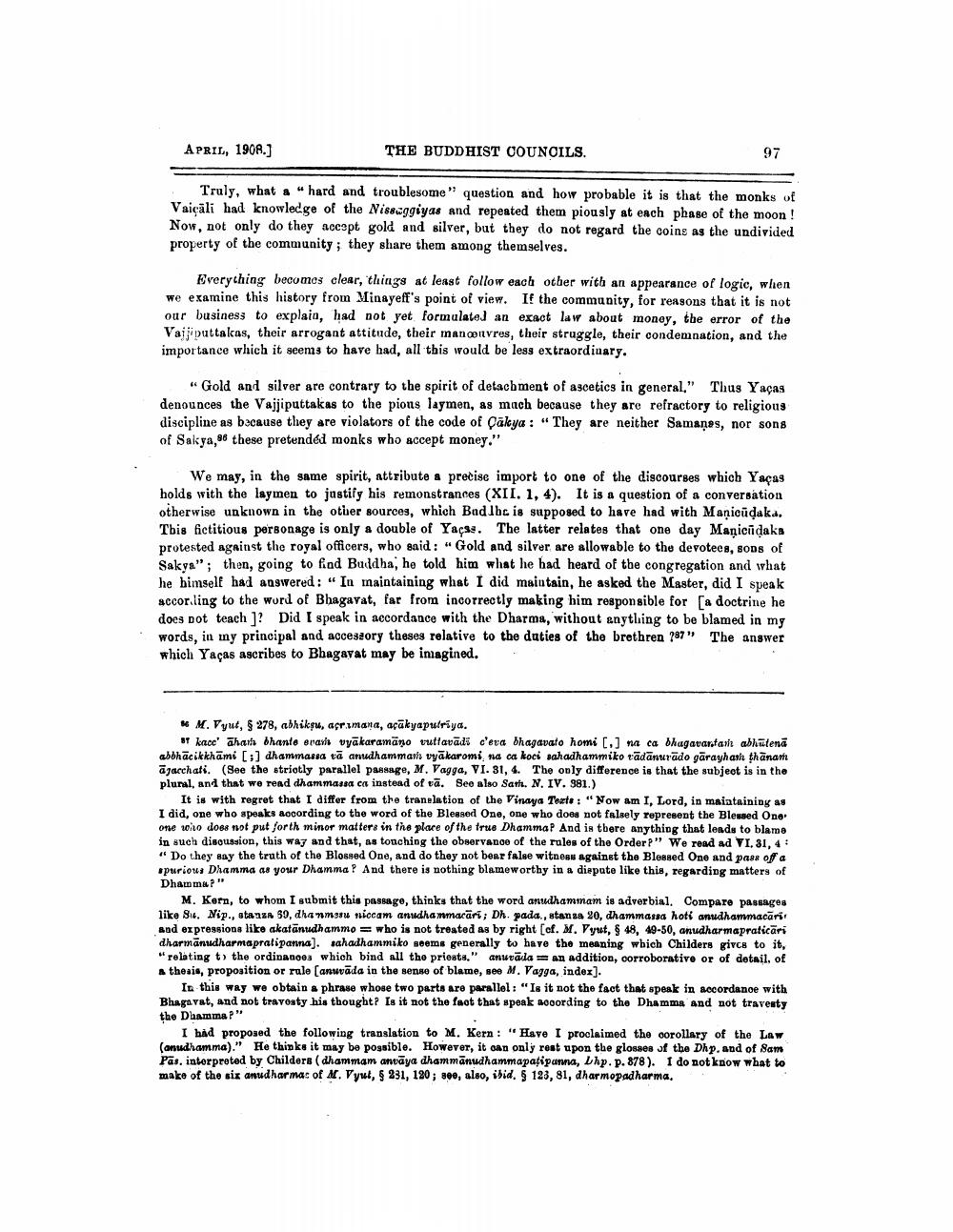________________
APRIL, 1908.)
THE BUDDHIST COUNCILS.
97
Truly, what a "hard and troublesome" question and how probable it is that the monks of Vaicāli had knowledge of the Nissaggiyas and repeated them piously at each phase of the moon ! Now, not only do they accept gold and silver, but they do not regard the coins as the undivided property of the community; they share them among themselves.
Everything becomes clear, things at least follow each other with an appearance of logie, when we examine this history from Minayeff's point of view. If the community, for reasons that it is not our business to explaio, had not yet formulated an exact law about money, the error of the Vaijputtakas, their arrogant attitude, their maneuvres, their struggle, their condemnation, and the importance which it seems to have had, all this would be less extraordinary.
"Gold and silver are contrary to the spirit of detachment of ascetics in general." Thus Yaças denounces the Vajjiputtakas to the pious laymen, as much because they are refractory to religious discipline as because they are violators of the code of Cakya: " They are neither Samaņes, nor sons of Sakya,' these pretended monks who accept money."
We may, in the same spirit, attribute a precise import to one of the discourses which Yaças holds with the laymen to justify his remonstrances (XII. 1, 4). It is a question of a conversation otherwise unknown in the other sources, which Bad Ibc is supposed to have had with Manicūdaka. This fictitious personage is only a double of Yaçse. The latter relates that one day Manici daks protested against the royal officers, who said: "Gold and silver are allowable to the devotees, sods of Sakya"; then, going to find Buddha, he told him what he had heard of the congregation and what he himselt had answered: “In maintaining what I did maintain, he asked the Master, did I speak accor.ling to the word of Bhagavat, far from incorrectly making him responsible for [a doctrine he does not teach]? Did I speak in accordance with the Dharma, without anything to be blamed in my words, in my principal and accessory theses relative to the duties of the brothren 787" The answer which Yaças ascribes to Bhagavat may be imagined.
* M. Vyut, $ 278, abhikṣu, aprumana, acākyapuriya.
BT kace' ahan bhante era vyākaramāno vuttavādi c'era bhagavato homi [.) na ca bhagavartant abhūtenā abbhācikkhāmi [:] dhammassa tā amudhammani vyā karomi na ca koci sahadhammiko rādānurado gārayhash thānam āgacchati. (See the striotly parallel pannage, M. Vagga, VI. 31, 4. The only difference is that the subject is in the plural, and that we read dhammassa on instead of tā. See also Sarh. N. IV. 381.)
It is with regret that I differ from the tranelation of the Vinaya Texte : "Now am I, Lord, in maintaining as I did, one who speaks according to the word of the Blessed One, one who does not falsely represent the Blessed Ono one who does not put forth minor matters in the place of the true Dhamma? And is there anything that leads to blame in such disgussion, this way and that, as touching the observance of the rules of the
At, as touching the observance of the rules of the Order" We read ad VI. 31, 4: "Do they say the truth of the Blossed One, and do they not bear false witness against the Blessed One and pass of a spuriona Dhamma as your Dhamma ? And there is nothing blemeworthy in a diapate like this, regarding matters of Dhamma?"
M. Kern, to whom I submit this passage, thinks that the word andhammam is adverbial. Compare passages like 86. Nip., stanza 59, dha nms riccam andhammacarí; Dh. pada., stanza 20, dhammassa hotí a udhammacāri. and expressions liko akatānudhammo = who is not treated as by right (cf. M. Vyut, 48, 49-50, audharmapraticari dharmanudharmapratipanna). Tahadhammiko seems generally to have the meaning which Childers givce to it, "relating to the ordinances which bind all the priests." anuvāda = an addition, corroborative or of detail of thesis, proposition or rule (anwvāda in the sense of blame, sep M. Vagga, index).
In this way we obtain a phrase whose two parts are parallel: "Is it not the fact that speak in accordance with Bhagavat, and not travesty his thought? Is it not the fact that speak according to the Dhamma and not travesty the Dhamma?"
I had proposed the following translation to M. Kern: "Have I proclaimed the corollary of the Law Canudhamma)." He thinks it may be possible. However, it can only rost upon the glosses of the Dhp. and of Sam Pas, interpreted by Childers (dhammam anvāya dhammānudhammaparipurna, Lhp. p. 878). I do not know what to make of the six anudharma of M. Vyut, $ 331, 190; see, also, ibid. 5 123, 81, dharmopadharma.




